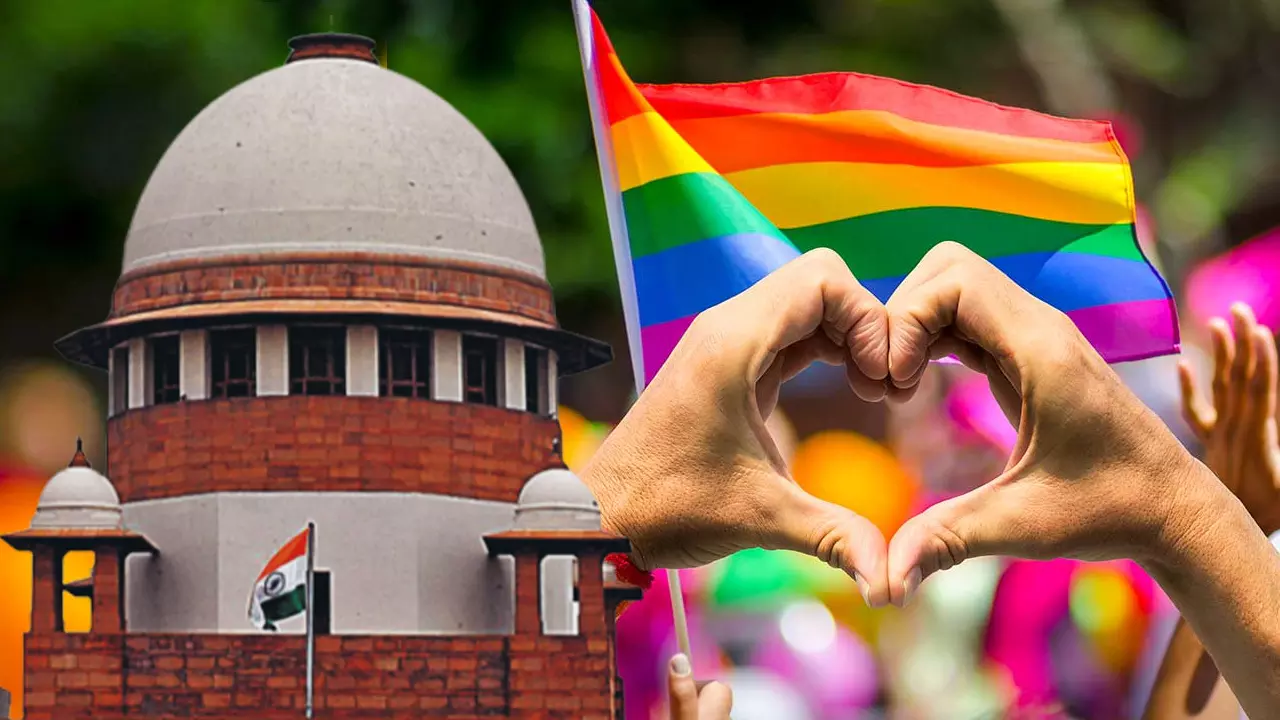Description

Copyright infringement not intended
Context: Important Supreme Court decisions that have influenced LGBTQ rights in India.
Details
- In recent years, there has been a remarkable shift in the judicial recognition and protection of LGBTQ rights, due to the efforts of activists, lawyers, NGOs and allies who have challenged the discriminatory laws and practices that violate the dignity and equality of LGBTQ people.
Important Supreme Court verdict related to LGBTQ rights
2009: Naz Foundation v/s Government of NCT Delhi case
- The Delhi High Court declared Section 377 of the Indian Penal Code (IPC), which criminalized consensual homosexual acts as "unnatural offences", to be unconstitutional and violative of Articles 14, 15 and 21 of the Constitution, which guarantee the rights to equality, non-discrimination and life with dignity.
- The court held that sexual orientation is an innate and immutable aspect of one's identity and that criminalizing it amounts to stigmatizing and oppressing a vulnerable minority group.
2013: Suresh Kumar Koushal v/s Union of India
- The progressive judgment made in the Naz Foundation case was overturned by the Supreme Court, in the Suresh Kumar Koushal v/s Union of India case.
- The court reinstated Section 377 and dismissed the arguments of LGBTQ petitioners as "infinitesimally small" and "minuscule".
- The court also held that Section 377 does not violate any fundamental rights and that it is up to the Parliament to amend or repeal it.
- This judgment was widely criticized by human rights activists, lawyers, academics and celebrities as a retrograde step that ignored the lived realities and struggles of LGBTQ people in India.
.jpeg)
2014: NALSA v/s Union of India
- In 2014, in the National Legal Services Authority (NALSA) v/s Union of India case, the Supreme Court recognized transgender people as a third gender and affirmed their right to self-identify their gender identity.
- The court also extended all fundamental rights to transgender people and directed the central and state governments to take measures to ensure their welfare, education, employment, health care and social inclusion.
- The court relied on the principle of constitutional morality, which requires that constitutional values prevail over societal norms and prejudices.
2017: Justice K S Puttaswamy v/s Union of India
- A nine-judge bench of the Supreme Court unanimously held that the right to privacy is a fundamental right under Article 21 of the Constitution, in the case of Justice K S Puttaswamy v/s Union of India.
- The court observed that privacy includes "at its core the preservation of personal intimacies, the sanctity of family life, marriage, procreation, the home and sexual orientation".
- The court also overruled its previous judgments that upheld Section 377 and stated that "sexual orientation is an essential attribute of privacy.
2018: Navtej Singh Johar v Union of India
- Finally, in 2018, a five-judge bench of the Supreme Court delivered a historic verdict in the case of Navtej Singh Johar v/s Union of India.
- The Supreme Court struck down Section 377 as unconstitutional and decriminalized homosexuality in India.
- The court held that Section 377 violates Articles 14, 15, 19 and 21 of the Constitution and that LGBTQ people are entitled to equal citizenship, dignity, autonomy, expression and protection from discrimination.
- The court also recognized that LGBTQ people have suffered centuries of oppression and marginalization and that they deserve an apology from society for denying them their basic human rights.

LGBTQ Rights in India and Challenges
- India is a diverse country with a rich cultural heritage and a history of tolerance and pluralism. However, when it comes to the rights and dignity of lesbian, gay, bisexual, transgender and queer (LGBTQ) people, India still has a long way to go.
- Despite some recent legal and social reforms, LGBTQ people in India face various challenges and barriers that prevent them from living freely and equally.
Challenges Faced by LGBTQ People
- Lack of legal recognition and protection: Although the Supreme Court of India decriminalized consensual same-sex relations in 2018, overturning a colonial-era law (Section 377 of the Indian Penal Code), no law explicitly prohibits discrimination or violence on the grounds of sexual orientation or gender identity.
- They are often denied access to basic rights and services such as education, health care, employment, housing, inheritance, marriage and adoption.
- They face harassment, blackmail, extortion, abuse and hate crimes from the police, family members, employers, landlords and strangers.
- Social stigma and prejudice that pervades society: LGBTQ people are often seen as unnatural, immoral, sinful or diseased by the dominant culture.
- They are subjected to ridicule, mockery, bullying, ostracism and exclusion from their families, communities and religious institutions.
- They are also influenced by internalized homophobia, which affects their self-esteem, mental health and well-being.
- Lack of awareness and education about LGBTQ issues among the general public and the authorities: There is widespread ignorance and misinformation about the diversity and complexity of human sexuality and gender identity.
- There is also a lack of sensitivity and empathy towards the lived experiences and struggles of LGBTQ people.
- Many people hold negative stereotypes and myths about LGBTQ people, such as they are abnormal, unnatural, contagious, predatory or corrupting.
- There is also a lack of representation and visibility of LGBTQ people in the media, literature, arts and culture.
How to change the present situation
- There is a need for concerted efforts from various stakeholders: The government should enact comprehensive anti-discrimination laws that protect LGBTQ people from all forms of violence and discrimination.
- The government should also recognize and respect the diversity of sexual orientation and gender identity, and provide legal recognition and protection to same-sex couples and transgender persons.
- The government should also ensure that LGBTQ people have equal access to education, health care, employment, housing and other social services.
- Civil society should play an active role in creating a safe and supportive environment for LGBTQ people: Civil society should raise awareness and educate the public about LGBTQ issues through campaigns, workshops, seminars, publications and media.
- Civil society should also provide support and assistance to LGBTQ people through counselling, helplines, shelters, legal aid and advocacy.
- Civil society should also foster dialogue and collaboration among various groups and communities to promote mutual understanding and respect.
- The LGBTQ community itself should also be empowered and mobilized to claim their rights and dignity: They should form networks and organizations that represent their interests and needs.
- They should also celebrate their diversity and identity through cultural events, festivals, parades and pride marches.
- They should also challenge the stereotypes and myths about them through their voices, stories and expressions.
Way Forward
- The Supreme Court judgments have been instrumental in advancing LGBTQ rights in India and have opened up new possibilities for challenging other forms of discrimination and exclusion faced by LGBTQ people in various spheres of life. However, there is still a long way to go before LGBTQ people can enjoy full equality and acceptance in India.
- Some of the issues that need to be addressed include legal recognition for same-sex marriage or civil unions, adoption rights for same-sex couples, anti-discrimination laws in employment, education and healthcare sectors, and sensitization programs for law enforcement agencies, media and society at large, among others.
- It is hoped that the judiciary will continue to uphold the constitutional morality and values that underpin these judgments and that the legislature will enact progressive laws that reflect the changing realities and aspirations of LGBTQ people in India.
Conclusion: LGBTQ rights are human rights. LGBTQ people are citizens of India who deserve respect, dignity and equality. By addressing the challenges faced by LGBTQ people in India, we can create a more inclusive, tolerant and progressive society for all.
Must Read Articles:
Same-Sex Mariage: https://www.iasgyan.in/daily-current-affairs/same-sex-marriage
Same-Sex Mariage in India: https://www.iasgyan.in/blogs/same-sex-marriage-in-india
Uganda and LGBTQ: https://www.iasgyan.in/daily-current-affairs/uganda-and-lgbtq-18
|
PRACTICE QUESTION
Q. How can India ensure the full inclusion and protection of LGBTQ people in its society and legal system, given the historical and cultural barriers that have marginalized them for decades?
|

https://indianexpress.com/article/explained/explained-law/key-sc-verdicts-that-moved-the-nneedle-on-LGBTQ-rights-8565720/













